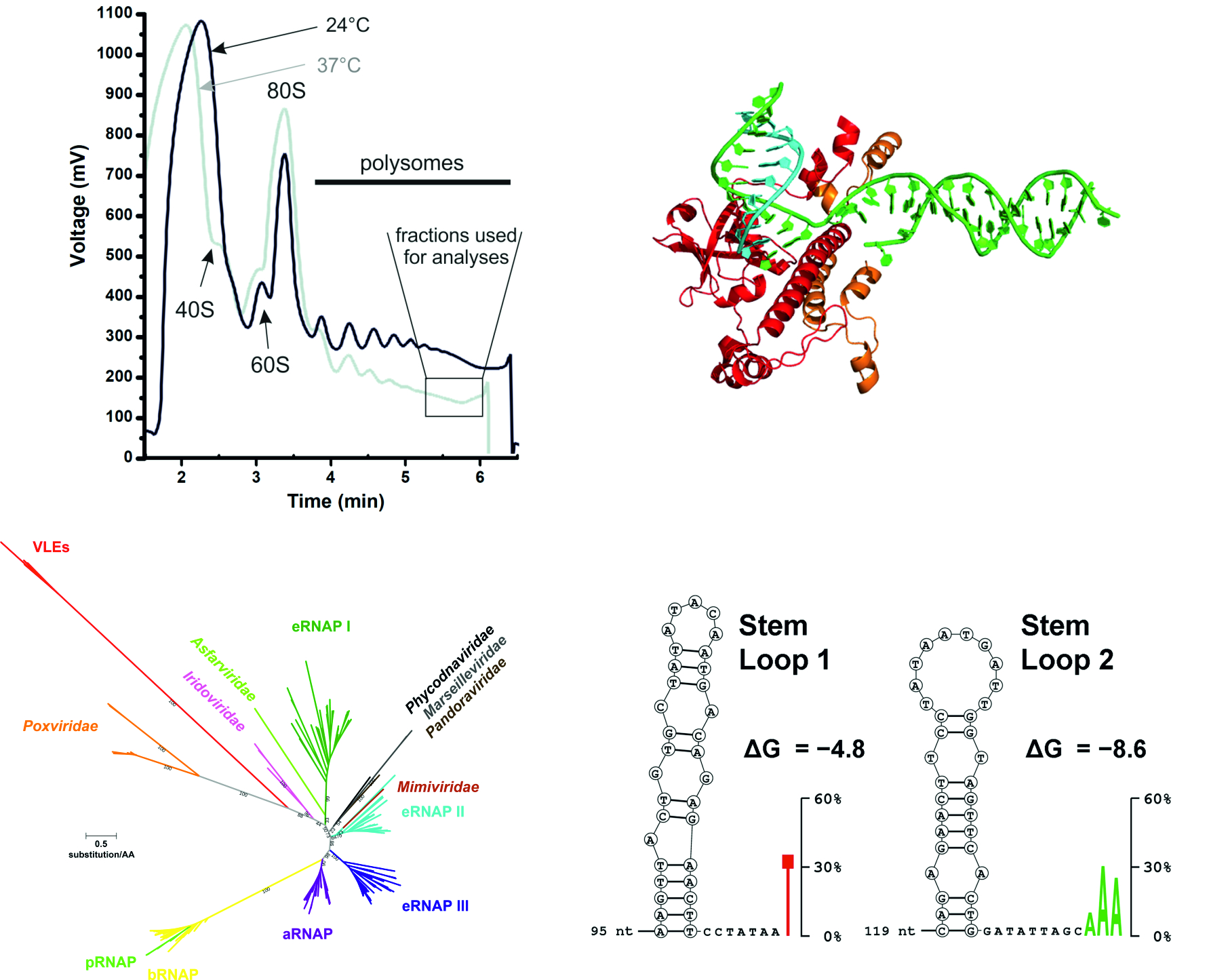Postdoctoral position is available for a biochemist / molecular biologist / structural biologist. Two projects are available. The first project is focused on study of synthesis and translation of 5' uncapped and polyadenylated viral mRNAs discovered by us in poxviruses and yeast DNA viruses. The second project is dedicated to cellular role of cap-binding translation initiation factors from the eIF4E family in cancer and development.
Poxviruses are highly contagious animal and human viruses. Prominent examples are variola virus, which is a causative agent of smallpox and was eradicated by WHO vaccination program 40 years ago, and vaccinia virus which is used as a smallpox vaccine. The study will be focused on deciphering structural details how closely related RNA polymerases from yeast DNA viruses and vaccinia virus synthesize uncapped 5' poly(A) mRNA leaders (Vopalensky et al., Front. Microbiol. 2019; Sykora et al., PLoS Pathog. 2018; Vopalensky et al. bioRxiv 2020).
Human genome encodes three independent members of the eIF4E family, each of them existing in several variants arising mainly due to alternative mRNA splicing. All the eIF4E isoforms have been shown to play an important role in development, cancer and cellular response to stress. eIF4E1 is a canonical cap-binding eukaryotic translation initiation factor. It's celular level and activity are tightly regulated, the latter by mTOR and Mnk kinases. Over-expression of eIF4E1 can lead to cellular transformation and indeed, up to one-third of human cancers demonstrate an increase in the eIF4E1 level. eIF4E2 protein is mainly recognized for its role in mRNA silencing. eIF4E2 also belongs among proteins, deregulation of which creates a part of metastatic cells signature. It has been shown to substitute eIF4E1 as a main cap-binding translation initiation factor during hypoxia. Contrary to all of that, eIF4E3 has been proposed to act as a tumor suppressor protein. The objective will be to map and analyze active protein complexes in which the non-canonical members of the eIF4E family, factors eIF4E2 and eIF4E3, take place in human cells and/or mouse oocytes and early embryos. We use both models and both of them offer an excellent opportunity to investigate less known, yet important members of the eIF4E factors family. (Frydryskova et al., BMC Mol. Biol. 2016; Mrvová et al., Mol. Genet. Genomics 2018; Masek et al., Int. J. Mol. Sci. 2020; Del Llano et al., Aging Cell 2020).
We offer an enthusiastic team and well equipped laboratories located in the very centre of Prague with access to the top-notch service facilities in the Faculty of Science and Biocev. We closely co-operate with several laboratories in EMBL, Heidelberg (mainly with the Genomics Core Facility) and for the high-demanding programming and computing with the Department of Computer Science of the Czech Technical University in Prague. We have developed several lines of study for both projects, involving different biological models and a palette of approaches ranging from biochemical purification and characterization of the protein-protein and protein-RNA complexes to cell biology methods relying on microscopic techniques. A specific direction of the research will be discussed with the candidate taking into the account candidate's skills and scientific interests.
Qualification and experience. We are looking for a highly motivated, enthusiastic and qualified researcher who would like to join our team and effort. Strong background in biochemistry, especially purification and further structural characterization of proteins and protein-protein and/or RNA-protein complexes will be advantageous. Strong communication skills and the ability to interact and co-operate well with other scientists and students in the team are essential.
Lab website: https://www.natur.cuni.cz/biology/genetics/veda-a-vyzkum-1/laborator-biochemie-rna?set_language=en
Publication list: https://pubmed.ncbi.nlm.nih.gov/?term=pospisek+m&sort=pubdate

Funding and project approval:
Co-founding resources:
GAČR 19-13491S (2019-2021): In vitro oocyte culture vs in vivo oocyte development - is their physiology really comparable?
ELIXIR CZ research infrastructure project (2020-2022)(MEYS Grant No: LM2018131)
GA ČR 21-25504S (2021 - 2024): Yeast linear plasmids as a model for poxviral transcription.
Required application materials:
How to submit application materials:
Please send email with the required application materials to Dr. Martin Pospíšek: martin.pospisek@natur.cuni.cz, Faculty of Science, Charles University, Prague.
Application deadline:
The application deadline is July 23, 2021.
More information:
For more information please visit the webpage of the JUNIOR Fund project of the Charles University.